The last time we used Django 2.2 and Oracle 11g, there was a version conflict during migrate, and finally Upgrade Oracle to 12c to solve the problem
So can we solve this conflict in other ways? Think of a solution and practice it:
- Using Django 2.2 to migrate under Oracle 12C environment to create basic tables
- Export the base tables and import them into Oracle 11g database
- Connect Oracle 11g with Django 2.2
Implementation steps
1. Using Django 2.2 to migrate under Oracle 12C environment to create basic tables
This is done in the previous article. Connecting to the database, you can see 10 basic tables.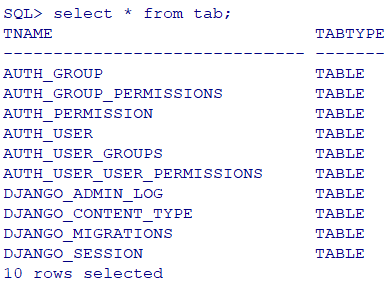
Looking at a table, such as the AUTH_GROUP table, it is found that an ID field is generated using a 12c-specific syntax. In addition to DJANGO_SESSION, each table has a self-increasing sequence of ID fields as the primary key.
-- Create table create table AUTH_GROUP ( id NUMBER(11) generated by default on null as identity, name NVARCHAR2(150) ) tablespace DJANGO; -- Create/Recreate primary, unique and foreign key constraints alter table AUTH_GROUP add primary key (ID) using index tablespace DJANGO; alter table AUTH_GROUP add unique (NAME) using index tablespace DJANGO;
2. Export the basic tables and import them into Oracle 11g database
Export django user database, pay attention to using 11g version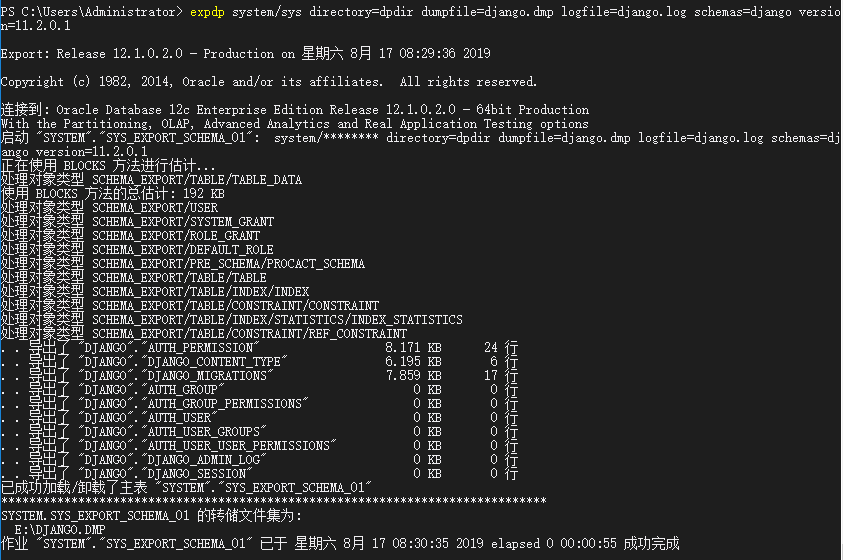
Then import to 11g database, very smoothly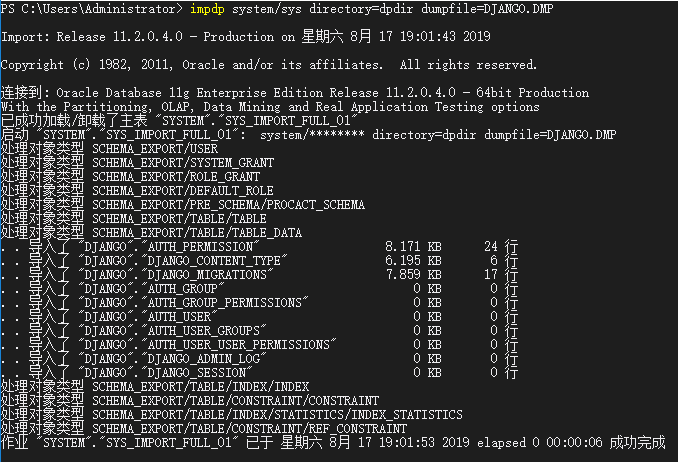
Looking at the AUTH_GROUP table, we find that the structure of the table is the same, but the default value of the self-increasing sequence on id is missing.
-- Create table create table AUTH_GROUP ( id NUMBER(11) not null, name NVARCHAR2(150) ) tablespace DJANGO; -- Create/Recreate primary, unique and foreign key constraints alter table AUTH_GROUP add primary key (ID) using index tablespace DJANGO; alter table AUTH_GROUP add unique (NAME) using index tablespace DJANGO;
3. Connect Oracle 11g with Django 2.2
Modify the settings file, connect Oracle11g, and then start the django service, and it started successfully.
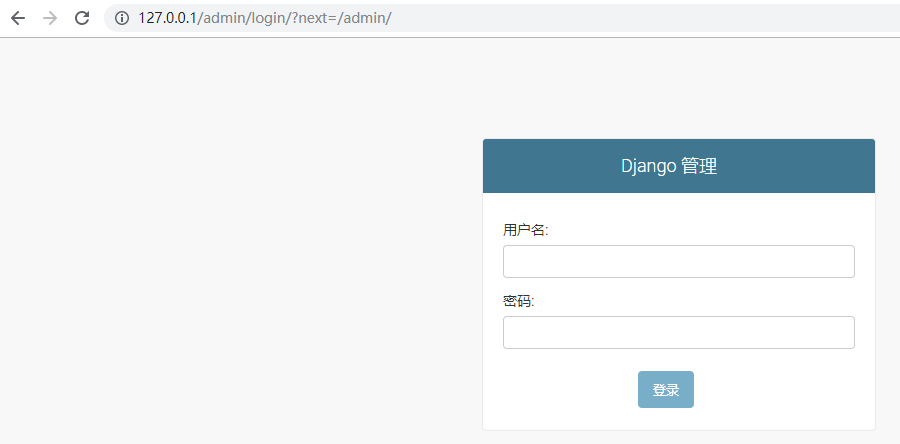
However, when creating admin user password, an error is reported, ORA-01400: cannot insert NULL in ("DJANGO", "AUTH_USER". "ID").
PS D:\parttime\python\django\guanxiangzhiji> python manage.py createsuperuser
//User name (leave blank to use'administrator'):
//E-mail address:
Password:
Password (again):
//The password length is too short. The password must contain at least eight characters.
//This password is too common.
Bypass password validation and create user anyway? [y/N]: y
Traceback (most recent call last):
File "D:\app\anaconda\lib\site-packages\django\db\backends\utils.py", line 84, in _execute
return self.cursor.execute(sql, params)
File "D:\app\anaconda\lib\site-packages\django\db\backends\oracle\base.py", line 510, in execute
return self.cursor.execute(query, self._param_generator(params))
cx_Oracle.IntegrityError: ORA-01400: cannot insert NULL into ("DJANGO"."AUTH_USER"."ID")
The above exception was the direct cause of the following exception:
Traceback (most recent call last):
File "manage.py", line 21, in <module>
main()
File "manage.py", line 17, in main
execute_from_command_line(sys.argv)
File "D:\app\anaconda\lib\site-packages\django\core\management\__init__.py", line 381, in execute_from_command_line
utility.execute()
File "D:\app\anaconda\lib\site-packages\django\core\management\__init__.py", line 375, in execute
self.fetch_command(subcommand).run_from_argv(self.argv)
File "D:\app\anaconda\lib\site-packages\django\core\management\base.py", line 323, in run_from_argv
self.execute(*args, **cmd_options)
File "D:\app\anaconda\lib\site-packages\django\contrib\auth\management\commands\createsuperuser.py", line 61, in execute
return super().execute(*args, **options)
File "D:\app\anaconda\lib\site-packages\django\core\management\base.py", line 364, in execute
output = self.handle(*args, **options)
File "D:\app\anaconda\lib\site-packages\django\contrib\auth\management\commands\createsuperuser.py", line 156, in handle
self.UserModel._default_manager.db_manager(database).create_superuser(**user_data)
File "D:\app\anaconda\lib\site-packages\django\contrib\auth\models.py", line 162, in create_superuser
return self._create_user(username, email, password, **extra_fields)
File "D:\app\anaconda\lib\site-packages\django\contrib\auth\models.py", line 145, in _create_user
user.save(using=self._db)
File "D:\app\anaconda\lib\site-packages\django\contrib\auth\base_user.py", line 66, in save
super().save(*args, **kwargs)
File "D:\app\anaconda\lib\site-packages\django\db\models\base.py", line 741, in save
force_update=force_update, update_fields=update_fields)
File "D:\app\anaconda\lib\site-packages\django\db\models\base.py", line 779, in save_base
force_update, using, update_fields,
File "D:\app\anaconda\lib\site-packages\django\db\models\base.py", line 870, in _save_table
result = self._do_insert(cls._base_manager, using, fields, update_pk, raw)
File "D:\app\anaconda\lib\site-packages\django\db\models\base.py", line 908, in _do_insert
using=using, raw=raw)
File "D:\app\anaconda\lib\site-packages\django\db\models\manager.py", line 82, in manager_method
return getattr(self.get_queryset(), name)(*args, **kwargs)
File "D:\app\anaconda\lib\site-packages\django\db\models\query.py", line 1186, in _insert
return query.get_compiler(using=using).execute_sql(return_id)
File "D:\app\anaconda\lib\site-packages\django\db\models\sql\compiler.py", line 1335, in execute_sql
cursor.execute(sql, params)
File "D:\app\anaconda\lib\site-packages\django\db\backends\utils.py", line 99, in execute
return super().execute(sql, params)
File "D:\app\anaconda\lib\site-packages\django\db\backends\utils.py", line 67, in execute
return self._execute_with_wrappers(sql, params, many=False, executor=self._execute)
File "D:\app\anaconda\lib\site-packages\django\db\backends\utils.py", line 76, in _execute_with_wrappers
return executor(sql, params, many, context)
File "D:\app\anaconda\lib\site-packages\django\db\backends\utils.py", line 84, in _execute
return self.cursor.execute(sql, params)
File "D:\app\anaconda\lib\site-packages\django\db\utils.py", line 89, in __exit__
raise dj_exc_value.with_traceback(traceback) from exc_value
File "D:\app\anaconda\lib\site-packages\django\db\backends\utils.py", line 84, in _execute
return self.cursor.execute(sql, params)
File "D:\app\anaconda\lib\site-packages\django\db\backends\oracle\base.py", line 510, in execute
return self.cursor.execute(query, self._param_generator(params))
django.db.utils.IntegrityError: ORA-01400: cannot insert NULL into ("DJANGO"."AUTH_USER"."ID")
Cause analysis
Obviously, when inserting into the AUTH_USER table, no value of the ID is specified, and the ID is the primary key, not empty.
Because in the 12c environment, this ID is a self-increasing sequence, the insert statement does not need to specify this value.
Solution
Solutions have emerged as the times require, as long as each ID column to create a 11g sequence, create triggers, when inserting data to fill in the ID value.
(1) Generating sequence.
Using sql statement
select 'create sequence seq_'||table_name||' minvalue 1 maxvalue 999999999 start with 1 increment by 1 cache 20;' from user_tab_columns where column_name='ID';
Generate and execute batch execution statements for creating sequences.
create sequence seq_DJANGO_ADMIN_LOG minvalue 1 maxvalue 999999999 start with 1 increment by 1 cache 20; create sequence seq_AUTH_USER minvalue 1 maxvalue 999999999 start with 1 increment by 1 cache 20; create sequence seq_AUTH_USER_GROUPS minvalue 1 maxvalue 999999999 start with 1 increment by 1 cache 20; create sequence seq_DJANGO_CONTENT_TYPE minvalue 1 maxvalue 999999999 start with 1 increment by 1 cache 20; create sequence seq_AUTH_GROUP minvalue 1 maxvalue 999999999 start with 1 increment by 1 cache 20; create sequence seq_AUTH_GROUP_PERMISSIONS minvalue 1 maxvalue 999999999 start with 1 increment by 1 cache 20; create sequence seq_DJANGO_MIGRATIONS minvalue 1 maxvalue 999999999 start with 1 increment by 1 cache 20; create sequence seq_AUTH_PERMISSION minvalue 1 maxvalue 999999999 start with 1 increment by 1 cache 20; create sequence seq_AUTH_USER_USER_PERMISSIONS minvalue 1 maxvalue 999999999 start with 1 increment by 1 cache 20;
(2) Create triggers
Using SQL statements
select 'create or replace trigger tri_'||table_name||' before insert on '||table_name||' for each row declare begin :new.id:=seq_'||table_name||'.nextval; end tri_'||table_name||'; /' from user_tab_columns where column_name='ID';
Generate trigger scripts:
create or replace trigger tri_DJANGO_MIGRATIONS before insert on DJANGO_MIGRATIONS for each row declare begin :new.id:=seq_DJANGO_MIGRATIONS.nextval; end tri_DJANGO_MIGRATIONS; / create or replace trigger tri_DJANGO_CONTENT_TYPE before insert on DJANGO_CONTENT_TYPE for each row declare begin :new.id:=seq_DJANGO_CONTENT_TYPE.nextval; end tri_DJANGO_CONTENT_TYPE; / create or replace trigger tri_AUTH_PERMISSION before insert on AUTH_PERMISSION for each row declare begin :new.id:=seq_AUTH_PERMISSION.nextval; end tri_AUTH_PERMISSION; / create or replace trigger tri_AUTH_GROUP before insert on AUTH_GROUP for each row declare begin :new.id:=seq_AUTH_GROUP.nextval; end tri_AUTH_GROUP; / create or replace trigger tri_AUTH_GROUP_PERMISSIONS before insert on AUTH_GROUP_PERMISSIONS for each row declare begin :new.id:=seq_AUTH_GROUP_PERMISSIONS.nextval; end tri_AUTH_GROUP_PERMISSIONS; / create or replace trigger tri_AUTH_USER before insert on AUTH_USER for each row declare begin :new.id:=seq_AUTH_USER.nextval; end tri_AUTH_USER; / create or replace trigger tri_AUTH_USER_GROUPS before insert on AUTH_USER_GROUPS for each row declare begin :new.id:=seq_AUTH_USER_GROUPS.nextval; end tri_AUTH_USER_GROUPS; / create or replace trigger tri_AUTH_USER_USER_PERMISSIONS before insert on AUTH_USER_USER_PERMISSIONS for each row declare begin :new.id:=seq_AUTH_USER_USER_PERMISSIONS.nextval; end tri_AUTH_USER_USER_PERMISSIONS; / create or replace trigger tri_DJANGO_ADMIN_LOG before insert on DJANGO_ADMIN_LOG for each row declare begin :new.id:=seq_DJANGO_ADMIN_LOG.nextval; end tri_DJANGO_ADMIN_LOG; /
(3) Creating admin users at this time is successful
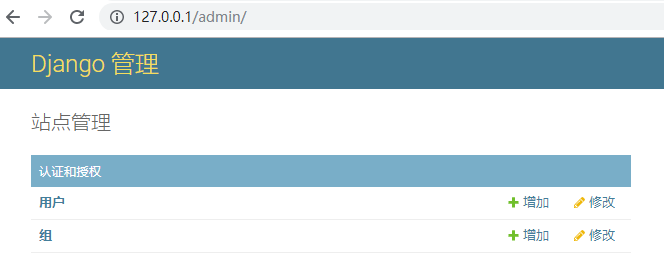
New user lurenjia succeeded!